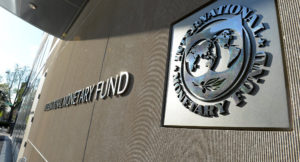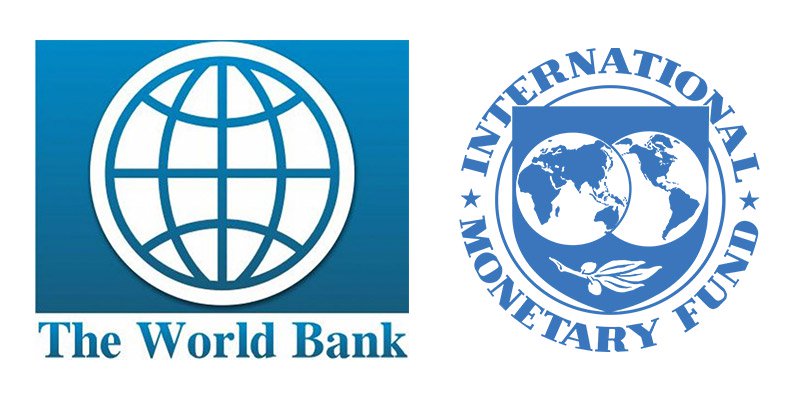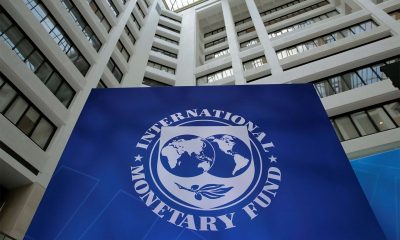Economy
Niger’s Overall Macroeconomic Performance Okay In 2016—IMF


By Modupe Gbadeyanka
A recently released report by the International Monetary Fund (IMF) has said Niger’s overall macroeconomic performance has remained satisfactory in 2016 despite the security and humanitarian shocks, the unfavourable commodity prices, and the reduction of trade flows to neighbouring countries.
An IMF team to Niger led by Mr Anta Gueye visited Niamey from October 24 to November 7, 2016 to conduct the 2017 Article IV consultation and discuss a successor Extended Credit Facility (ECF) arrangement that could support Niger’s medium-term economic and financial program.
At the end of the mission, Mr Gueye said the Nigerien authorities and the IMF team reached a staff-level agreement on a medium-term program (2017-2020) that could be supported by a successor ECF.
According him, the new program builds on lessons of the current ECF arrangement.
He said in the report that while the 2012-2016 ECF-supported program helped maintain macroeconomic stability despite a series of substantial adverse exogenous shocks and implementation slippages, allocations for health and education were crowded out by priority security expenses, which constrained the achievement of broader development objectives.
“The new program aims at preserving macroeconomic stability and at achieving the development objectives of the Economic Development Document,” he explained in the report obtained by Business Post.
He added that in view of the elevated security spending needs and the persisting shocks to government revenue, policies under the new program focus on domestic revenue mobilization, by broadening the tax base, and on strengthened budget management, to provide the needed fiscal space and ensure debt sustainability.
The program, Mr Gueye explained, also includes a strong agenda for structural reforms to strengthen public financial management, support the diversification of the economy and enhance resilience, while reflecting limited capacity.
He said the country’s growth is projected to increase to 4.5 percent in 2016 from 3.5 percent in 2015, helped by a strong 2016/17 crop year and despite continued weakness in the oil and mining sectors. Inflation would be contained at 1.6 percent in 2016.
“Budget execution has been impacted by lower-than-targeted revenue collection partly due to unfavourable developments in commodity sectors and continued economic problems in neighbouring countries.
“At end-June 2016, most fiscal targets other than for government revenue were however met. Progress was made in implementing structural reforms, albeit with delays.
“In response to a larger shortfall of revenue collection in the second half of 2016, the authorities curtailed commitments on non-priority expenditures for the last quarter of 2016. This measure enacted by the inter-ministerial budget regulation committee will help avoid the accumulation of payments arrears and the resort to domestic financing,” the report said.
“The economic outlook for the medium-term is favourable, but remains subject to substantial external and domestic risks. Real GDP growth is projected to increase to 5.2 percent in 2017, driven by agriculture and an expected pick-up in oil production. Inflation is expected to remain contained below 2 percent.
“Real GDP growth is expected to average 6.0 percent during 2018- 2021, mainly as a result of the expansion of the extractive industries sector and an increase in public and private investments. Inflation is expected to remain below the 3 percent WAEMU convergence criterion.
“Key risks include negative externalities of regional conflicts, vulnerability to natural disasters, and the economic turmoil in the sub-region.
“The Article IV discussions focused on preventing and managing natural disasters, harnessing the demographic dividend, and dealing with the gender issue in Niger.
“The mission met with President Issoufou Mahamadou and Prime Minister Brigi Rafini. The mission held also working sessions with the Minister of Finance, Mr, Massoudou Hassoumi, other Ministers in charge of Planning, Petroleum, Mines, the Minister Delegate for Budget, the National Director of the BCEAO, as well as other senior government officials. The staff also met with representatives of civil society, the private sector, and the donor community,” the report said.
Economy
Champion Breweries Concludes Bullet Brand Portfolio Acquisition

By Aduragbemi Omiyale
The acquisition of the Bullet brand portfolio from Sun Mark has been completed by Champion Breweries Plc, a statement from the company confirms.
This marks a transformative milestone in the organisation’s strategic expansion into a diversified, pan-African beverage platform.
With this development, Champion Breweries now owns the Bullet brand assets, trademarks, formulations, and commercial rights globally through an asset carve-out structure.
The assets are held in a newly incorporated entity in the Netherlands, in which Champion Breweries holds a majority interest, while Vinar N.V., the majority shareholder of Sun Mark, retains a minority stake.
Bullet products are currently distributed in 14 African markets, positioning Champion Breweries to scale beyond Nigeria in the high-growth ready-to-drink (RTD) alcoholic and energy drink segments.
This expansion significantly broadens the brewer’s addressable market and strengthens its revenue base with an established, profitable portfolio that already enjoys strong brand recognition and consumer loyalty across multiple markets.
“The successful completion of our public equity raises, together with the formal close of the Bullet acquisition, marks a defining moment for Champion Breweries.
“The support we received from both existing shareholders and new investors reflects strong confidence in our long-term strategy to build a diversified, high-growth beverage platform with pan-African scale.
“Our focus now is on disciplined execution, integration, and delivering sustained value across markets,” the chairman of Champion Breweries, Mr Imo-Abasi Jacob, stated.
Through this transaction, Champion Breweries is expected to achieve enhanced foreign exchange earnings, expanded distribution leverage across African markets, integrated supply chain efficiencies, portfolio diversification into high‑growth consumer beverage categories, and strengthened presence in the RTD and energy drink segments.
The acquisition accelerates Champion Breweries’ transition from a regional brewing business to a multi-category consumer platform with continental reach.
Bullet Black is Nigeria’s leading ready-to-drink alcoholic beverage, while Bullet Blue has built a strong presence in the energy drink category across several African markets.
Economy
M-KOPA Nigeria Plans Expansion to Edo, Others After N231bn Credit Milestone

By Adedapo Adesanya
Emerging market fintech firm, M-KOPA, has announced plans to deepen its reach in Nigeria to the South South and South East regions, starting with Edo this year, after providing N231 billion in credit to over 1 million customers in the country.
The firm released its first Nigeria-focused Impact Report, which showed that Nigeria is M-KOPA’s fastest-growing market and fastest to reach the milestone.
Since its foray into the Nigerian market in 2019, M-KOPA has been working to dismantle barriers to financial inclusion by providing flexible smartphone financing and digital financial tools that align with how people in the informal economy earn and manage their money.
It operates in six states in the country, including Lagos, Ogun, and Oyo, among others.
The report highlights the company’s contribution to income generation, digital inclusion and economic opportunity for Every Day Earners across the country.
The report showed that M-KOPA has enabled 290,000 first-time smartphone users, while 56 per cent of agents accessed their first income opportunity through the platform.
It showed high income and livelihood gains among its users, with about 77 per cent of customers leveraging smartphones or digital loans obtained through the platform to generate income, indicating that access to financed devices is directly supporting micro-entrepreneurial activity and informal sector productivity.
Furthermore, 75 per cent of users report higher earnings since gaining access to M-KOPA’s services, suggesting measurable improvements in personal revenue streams. On the distribution side, 99 per cent of agents disclose increased earnings, reflecting positive spillover effects across the company’s value chain.
In addition, 81 per cent of long-term customers state that their household expenses have improved, pointing to enhanced financial stability and better consumption smoothing over time.
Speaking on the report, Mr Babajide Duroshola, General Manager, M-KOPA Nigeria, said, “Nigeria represents extraordinary potential, and we’re proud that it has become M-KOPA’s fastest-growing market. Our Impact Report shows that when Every Day Earners gain access to the right digital and financial tools, they use them to create stability and long-term progress for their families. This is about access that unlocks opportunity and sustained prosperity.”
On its expansion plans Nigeria-wide, the M-KOPA helmsman said, “Many of the states we are considering are already similar to the ones we are currently in proximity… So, there is proximity and similarity between these states, and that’s what we are going to do, starting with Edo.”
He noted that as M-KOPA Nigeria continues to expand, the focus remains on ensuring more everyday earners gain access to the digital and financial tools they need to build resilient, prosperous futures in Nigeria’s rapidly digitising economy.
Economy
Tinubu Okays Extension of Ban on Raw Shea Nut Export by One Year

By Aduragbemi Omiyale
The ban on the export of raw shea nuts from Nigeria has been extended by one year by President Bola Tinubu.
A statement from the Special Adviser to the President on Information and Strategy, Mr Bayo Onanuga, on Wednesday disclosed that the ban is now till February 25, 2027.
It was emphasised that this decision underscores the administration’s commitment to advancing industrial development, strengthening domestic value addition, and supporting the objectives of the Renewed Hope Agenda.
The ban aims to deepen processing capacity within Nigeria, enhance livelihoods in shea-producing communities, and promote the growth of Nigerian exports anchored on value-added products, the statement noted.
To further these objectives, President Tinubu has authorised the two Ministers of the Federal Ministry of Industry, Trade and Investment, and the Presidential Food Security Coordination Unit (PFSCU), to coordinate the implementation of a unified, evidence-based national framework that aligns industrialisation, trade, and investment priorities across the shea nut value chain.
He also approved the adoption of an export framework established by the Nigerian Commodity Exchange (NCX) and the withdrawal of all waivers allowing the direct export of raw shea nuts.
The President directed that any excess supply of raw shea nuts should be exported exclusively through the NCX framework, in accordance with the approved guidelines.
Additionally, he directed the Federal Ministry of Finance to provide access to a dedicated NESS Support Window to enable the Federal Ministry of Industry, Trade and Investment to pilot a Livelihood Finance Mechanism to strengthen production and processing capacity.
Shea nuts, the oil-rich fruits from the shea tree common in the Savanna belt of Nigeria, are the raw material for shea butter, renowned for its moisturising, anti-inflammatory, and antioxidant properties. The extracted butter is a principal ingredient in cosmetics for skin and hair, as well as in edible cooking oil. The Federal Government encourages processing shea nuts into butter locally, as butter fetches between 10 and 20 times the price of the raw nuts.
The federal government said it remains committed to policies that promote inclusive growth, local manufacturing and position Nigeria as a competitive participant in global agricultural value chains.
-

 Feature/OPED6 years ago
Feature/OPED6 years agoDavos was Different this year
-
Travel/Tourism10 years ago
Lagos Seals Western Lodge Hotel In Ikorodu
-

 Showbiz3 years ago
Showbiz3 years agoEstranged Lover Releases Videos of Empress Njamah Bathing
-

 Banking8 years ago
Banking8 years agoSort Codes of GTBank Branches in Nigeria
-

 Economy3 years ago
Economy3 years agoSubsidy Removal: CNG at N130 Per Litre Cheaper Than Petrol—IPMAN
-

 Banking3 years ago
Banking3 years agoSort Codes of UBA Branches in Nigeria
-

 Banking3 years ago
Banking3 years agoFirst Bank Announces Planned Downtime
-

 Sports3 years ago
Sports3 years agoHighest Paid Nigerian Footballer – How Much Do Nigerian Footballers Earn





















